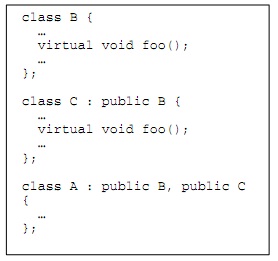Multiple Inheritance: In C++, multiple-inheritance occurs when a class inherits from more than one parent. For example:

Multiple inheritance used with several non-pure virtual bases cannot be translated into a simple class hierarchy in modeling languages such as Java, and might require significant delegation overhead to reach base class fields and virtual methods. The presence of multiple inheritance also requires explicit control about the constructor calling sequence, and therefore cannot be modeled with constructors in languages such as Java.